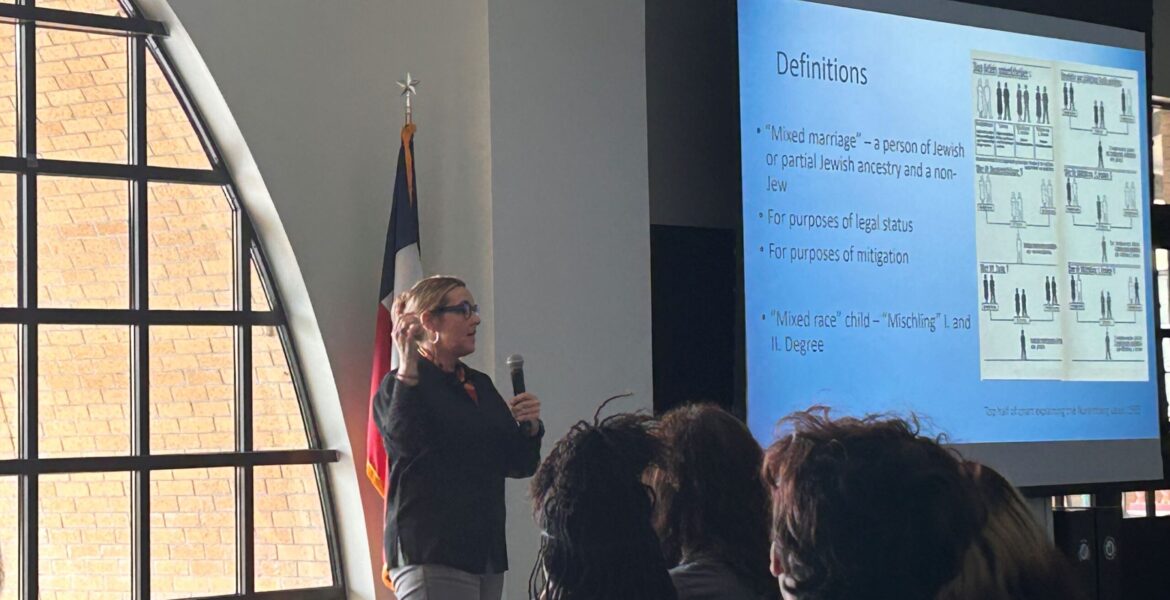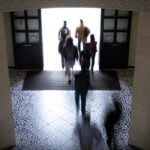Intermarried Jews and non-Jews in Eastern Europe experienced anguish as their families were torn apart during World War II, a Holocaust researcher said April 23 at Texas A&M University-San Antonio.
“When you look closer at the fates of these intermarried families, the picture becomes a good deal more complicated,” said Dr. Tatjana Lichtenstein, associate professor, modern Eastern Europe, at the University of Texas at Austin.
Lichtenstein spoke to a crowd of professors, college students and eighth-grade students from the KIPP public school in the Vista Room on the fourth floor of the Central Academic Building.
Lichtenstein, whose research focuses on minorities, nationalism, state building, war and genocide in Eastern Europe in the 20th century, discussed the experiences of intermarried Jewish and non-Jewish families during World War II.
Lichtenstein is working on a book titled “Intimacy and Persecution: Jews, Non-Jews, and the Holocaust in the Bohemian Lands.”
It was Lichtenstein’s first time visiting A&M-San Antonio and discussing her research on intermarried families and the Holocaust.
“I have had the fortune to work with survivors, descendants who have given me access to family letters, photo albums, testimonies documents in the family’s possession,” Lichtenstein said.“I have worked with very knowledgeable and supportive activists and librarians who have helped me collect materials.”
She described the experience of working with the surviving families and how it truly helped her research.
She said she is “extremely grateful” for the families who have given her insight into their lives and their family history for her to present the most accurate research.
Lichtenstein gave the audience a look into how intermarried families experienced persecution, how the Jewish family members would be taken to a train station and from there they would be transported to a concentration camp.
The non-Jewish relatives would be left with a guilty feeling of dropping off their family members at the train stations not knowing where they would be going.
First-born children of such marriages were considered Jewish upon their 14th birthday.
Lichtenstein described three children born to an intermarried couple. When the oldest son turned 14, he joined his Jewish father at a concentration camp. However, the two younger children were able to stay with their non-Jewish mother.
“On the one hand, intermarried Jewish families felt the persecution of Jews immediately and in often devastating ways,” Lichtenstein said. “But on the other hand, they had more ways to respond and seek to ease persecution that they themselves experienced and that their Jewish relatives experienced.”
For example, some couples would get divorced to preserve the safety of the non-Jewish spouse.
Lichtenstein took the audience through WWII, a time period in history where many questioned what happened to intermarried families, while showing a timeline of the region during the war.
Her presentation consisted of detailed maps and diagrams and photos of intermarried, non-Jewish and Jewish Czech families. She gave insight on Nazi methodology and language that impacted the families her research covered.
Lichtenstein discussed the unique environment of the Czech Republic during Nazi occupation and how that contributed to her research on the subject and region.
“One of the things that’s really important about the protectorate – what is today the Czech Republic – is that it is one of the places in 1939 where there were the most of these intermarried families,” she said.
She also discussed the unique experience of the ‘last Jews’ of the protectorate.
“Jews married to non-Jews, or those children who are considered ‘de-facto Jews’. Those are the only ones who have not been sent away,” Lichtenstein said of the remaining Jews transported to concentration camps near the end of the war.
She gave insight about how intermarried families were affected and persisted by telling their experiences and their fates.
Attendees, including students and Dr. William Kiser, history professor and department chair, asked Lichtenstein questions related to her research.
Lichtenstein concluded her talk by reflecting on how people of the present day analyze history.
“When we think about the Holocaust, we’re looking backward on history. That’s why we’re so clever, we know exactly what we would’ve done,” Lichtenstein said. “But people are living history forward and people don’t know what’s gonna happen.”
This story was updated at 4:48 p.m. May 9 to correct a misspelling in the headline.






